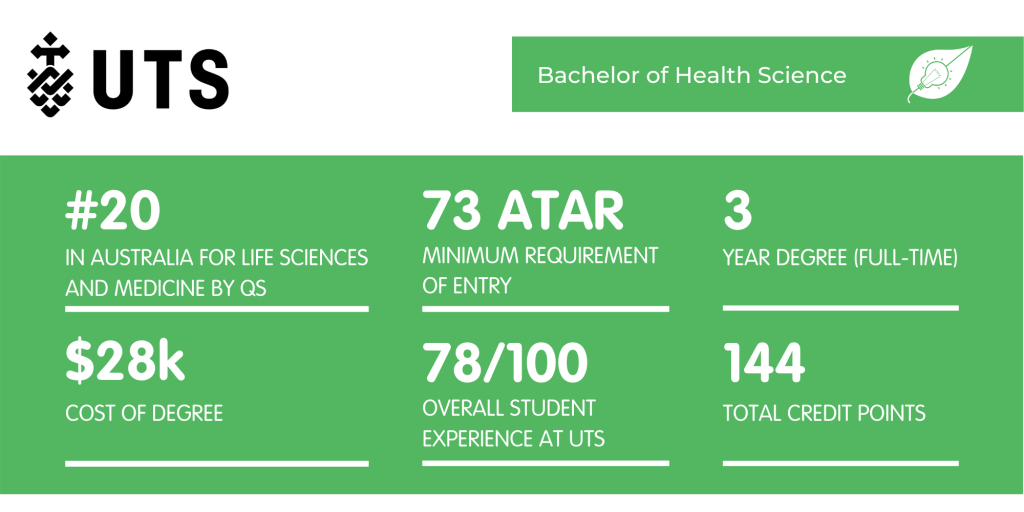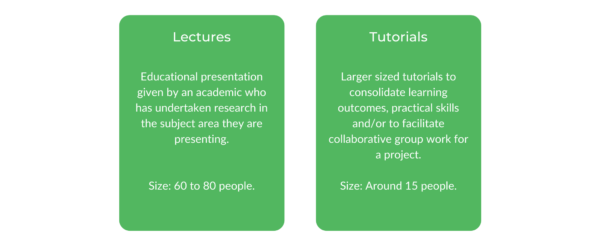Are you wondering what a Bachelor of Health Science at UTS is all about?
Well, keep scrolling, as you’ve found the right place.
Let’s roll!
What is a Bachelor of Health Science at UTS?
Core Units and Majors
How to Get into a Bachelor of Health Science at UTS
What’s the Teaching Format?
What’s the Faculty and Culture Like?
What is a Bachelor of Health Science at UTS?
Health Science is the non-clinical study of public health which aims to improve the lives of groups and individuals. It’s all about understanding the wider scope of health inequities in populations, and the issues that arise within social, cultural, economic and political aspects of our health and wellbeing.
Health Science at UTS is a very broad, flexible degree, where you’ll graduate to work across a variety of health-related disciplines. Some of these include health promotion, fields that engage in health data, epidemiology and biostatistics, as well as the ability to track and improve health systems and diseases, illness and injuries.
Either way, you’ll gain essential knowledge of governmental and non-governmental health services needed to pursue a career in the local and global health industry.
Honours
A Bachelor of Health Science (Honours) at UTS can be completed by Health Science graduates through an extra year of study.
Although honours is a very full on commitment, it will fundamentally enhance your skills in clinical health research within the professional context of health. You’ll be able to analyse health data and explore research of your own personal health interest to produce a substantial thesis.
Acceptance into honours will depend on your results. Not every graduate is guaranteed the opportunity to do honours – so if you want to do it, you’ve got to work for it.
Career Paths
A Health Science degree at UTS can provide you with the following career paths:
-
- Health promotion
- Advocacy
- Health education
- E-health
- Health data and information management systems
- Planning and policy
- Project management and evaluation
- Community development
- Research and consultancy across both public and private health sectors
Core Units and Majors
Core Units
For your first and second year of a Bachelor of Health Science, all your units will be core units – basically, compulsory subjects.
First Year
Here’s a little preview of the types of units you’ll be studying in first year:
| Core Unit | Description |
|---|---|
| Arguments, Evidence and Intuition | In this unit, you’ll develop numeracy, quantitative and critical thinking skills and learn how to apply them to health issues in society. |
| Interpersonal Communication | Efficient interpersonal and intra-professional communication are core skills for individuals working in the healthcare sector, which is what you’ll achieve in this unit. |
| Introduction to Public Health | This unit will allow you to gain knowledge of Australia’s public health system. |
| Introduction to Health Systems | This unit will introduce you to the functional aspects of Australian and global health care systems. |
Other core first year subjects include:
-
- Introduction to Health Statistics
- Introduction to Epidemiology
- Psychosocial perspectives in Health
- Principles in Primary Health Care
Second Year
In second year, you’ll only have six core units which are:
| Core Unit | Description |
|---|---|
| Introduction to Digital Health | This unit will introduce you to the ways that technology can fundamentally improve health reform, such as delivering clinical care in a safer way and improving the journey of patients. |
| Indigenous Health and Wellbeing | This unit focuses on learning about Aboriginal and Torres Strait Islander people’s health and wellbeing. |
| Health Promotion and Advocacy | This subject will introduce you to the practice of health promotion by examining local and national health promotion programs and policies. |
Other core second year subjects include:
-
- Non-Communicable Disease Prevention and Management
- Health Project Management
- Communicable Disease Prevention and Control
Majors
In second and third year, you have the choice to complete a major. These include:
| Major | Description |
|---|---|
| Global Health | Gain an understanding of how to tackle and improve health within individuals and different global populations. |
| Health Promotion | Learn how to analyse and improve healthy behaviours across populations and individuals through promotional campaigns and principles. |
| Indigenous Health | Develop extensive knowledge of the health and wellbeing of Indigenous Australians and how we can help close the gap. |
| Public Health | Learn about the essentials of public health through preventative disease research and policy methods. |
| Human Structure and Function | Enhance your scientific mind by developing a deeper understanding of the human body, specialising in physiology, neuroscience and anatomy. |
You can learn more in the UTS Health Science Handbook 2021!
Placements
In your final year of a Bachelor of Health Science at UTS, you will undertake a placement to gain industry experience at a professional level and set you up for your career in health. By completing a minimum of 140 hours with a range of organisations such as the National Heart Foundation, Cerebral Palsy Alliance and Neuroscience Research Australia (NeuRA), you’ll develop necessary practical skills and be able to cement your career goals.
The best thing about placements is that you’ll not only have the choice to complete a placement of your own interest, but you’ll be given fundamental networking opportunities that can secure you a job after you graduate.
These sorts of placements aren’t offered for health science students at other prestigious universities like USYD, so this is a massive advantage. The School of Public Health also help you source these placements, rather than having to source them yourself (which is what the UTS School of Sport, Exercise and Rehabilitation does).
How to Get into a Bachelor of Health Science at UTS
If you’re wanting to study full time for three years, the ATAR cut off is 73. However, if you can only study part time, which is six years, the ATAR cut off is 74.05.
Assumed Knowledge
There are no prerequisite subjects for a Bachelor of Health Science at UTS, but it is recommended you complete either Standard or Advanced English in Year 12. If you want to major in Human Structure and Function, it’s probably a good idea to have done Biology in Year 12 as well.
Scholarships
The Health Dean’s Scholarship is valued at $10,000 and is eligible for the highest ATAR undergraduate student within the UTS Faculty of Health. This student must also have this degree as their first UAC preference and demonstrate initiative and motivation to succeed within a Bachelor of Health Science.
What’s the Teaching Format?
UTS delivers its degrees over two semesters per year, so you won’t have to worry about trimesters like students at UNSW! You’ll mainly have classes that are lectures or workshops – which are similar to tutes.
Lectures
In your lectures, you’ll often be surround by 60 to 80 other students and you’ll learn a lot of theoretical concepts but you won’t really get to put them into practice. Don’t get too complacent though – you’ll need to remember the content from lectures to make the most out of your workshops.
Workshops
Within workshops, your class size is much smaller with only around 15 students attending. You’ll mostly undertake collaborative group work rather than individual work, but this depends on the subject you’re doing.
Group work will allow you to reflect, engage and adapt the theories and health practices you’ve learnt from your lecturers and tutors. Feedback sessions and community engagement activities will also be performed.
In third year, you’ll have some subjects taught by two tutors, so classes will be bigger but the second tutor compensates for the size.
How much time will you spend at university?
The number of contact hours a week is usually 10 to 15 hours (for four units a semester) depending on the subjects you’ve chosen. You’ll usually have two hour lectures and one hour workshops, but these can vary.
Attendance for each subject is twice a week – for both the lecture and the workshop.
Assessments
Assessments within a Bachelor of Health Science at UTS are balanced with both exams and assignments. There will be quizzes (worth 20% of your final grade), group presentation and/or essay (worth 45% of your final grade), sometimes a random (but more fun!) assessment task like an alternative reality game (which can be worth 45% of your final grade), and often a final end of semester exam (worth 40%).
These end of semester exams normally consist of multiple-choice and short-answer questions.
Skills That You Refine and Learn
A Bachelor of Health Science at UTS will develop your transdisciplinary skills so you can gain a wider understanding of health.
You’ll learn how to utilise and interpret data to improve health in a local and global context, and you’ll also know how to think critically in order to confront and prevent issues within the healthcare sector. Not to mention the strong health communication, statistics and specialist skills will also be refined – all of which are of high importance to employers within the health industry.
What’s the Faculty and Culture Like?
Faculty
The UTS Faculty of Health is quite large as it caters for the School of Nursing and Midwifery, School of Sport, Exercise and Rehabilitation and the School of Public Health (which is what Health Science is under).
That said, the School of Public Health has highly qualified, leading academic staff members who’ve had extensive experience within clinical, education, research and policy healthcare roles. Their knowledge of the latest research in public health is quintessential to teaching a degree of Health Science at UTS.
Culture
Students of a Bachelor of Health Science degree at UTS can choose to become a part of UTS Medical and Health Society (MedSoc). MedSoc is a fun, dynamic club that allows for all UTS health students to unite and enhance their professional and academic skills, whilst getting involved in lively social events.
As the UTS Faculty of Health is large, becoming a part of MedSoc will give you the opportunity to feel connected with other students that you have a lot in common with. They also host SciBall every year!
If you’re struggling academically, MedSoc runs fortnightly study sessions to all members/health students. These sessions will also give you the chance to meet others doing the same degree as you, and work together through academic content.
Support Programs
ActiveUTS is a service at UTS that is all about enhancing your university experience. Recently, they have been holding on-campus and Zoom mindfulness sessions for UTS students, in order to promote mental health and wellbeing and facilitate peer connections.
Want to learn more? Check out the pros and cons of this degree here!
Isabelle Plasto is a Content Writer at Art of Smart Education and in her third year of a Media and Communications degree at the University of Sydney, majoring in Digital Cultures. You can find her work published in Dementia Australia’s August 2020 eNewsletter, an organisation very close to her heart. Apart from writing, Issy loves to travel, cook and boogie to 70s disco music.






